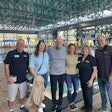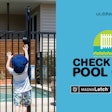The CPSA is leading the effort to protect the pool and spa industry’s interests amid the political struggle to cope with the drought in California. John Norwood, president of the California Pool And Spa Association, apprises us of recent events in the fight to maintain industry prosperity as the water crisis continues:
Recent Victories and Upcoming Threats to the Pool and Spa Industry
The CPSA’s drought campaign racked up two new victories this week, but also had a temporary setback. As the summer continues to heat up and water supplies diminish, CPSA is seeing more cities consider enacting water shortage contingency plans which often include bans on filling or refilling swimming pools, spas and hot tubs.
Last week, both the City of Thousand Oaks in Southern California and the City of West Sacramento voted to remove their previously enacted bans on filling or refilling swimming pools, spas and hot tubs. CPSA has been working with each of these cities since they enacted their prohibitions. As such, it is gratifying to quote the West Sacramento staff report on the subject which indicated "that only minimal water reductions are gained from prohibiting pool filling and refilling so the staff recommends that the Council authorize the City Manager to relax the pool restriction."
Unfortunately with the good news there always seems to be another challenge. On Tuesday, July 14th, the Laguna Beach City Council, without prior notice, voted unanimously to ban the construction of new pools in their city. This unwarranted action flies in the face of the fact that the water it would take to fill all permitted pools in Laguna Beach equals less than 1/100th of 1% of the city's annual water use. Moreover the city still allows the irrigation of lawns which are significantly less water efficient than swimming pools, spas and hot tubs.
CPSA had already engaged with the members of the city council and staff for the city to set the record straight. In addition, CPSA is questioning the legality of this action since a potential ban on construction was never given as official notice to the public.
Last week CPSA received six notices of possible action by local city councils in regions throughout the state that could restrict the use of potable water to fill or refill swimming pools, spas and hot tubs. Fortunately all but one of these addressed water issues but did not restrict water for pools, spas and hot tubs. Two of the cities proposed rebates for the purchase of swimming pool covers which more and more cities and water districts are considering. The City of Beverly Hills instituted a pool fill fee and are using the proceeds to fund specific water conservation measures.
MWELO on the Horizon
Another looming challenge comes in the form of a statewide regulation that has the capacity to greatly damage the pool industry. CPSA has submitted comments to the California Water Commission requesting the Commission disapprove the newest draft of the Model Water Efficient Landscape Ordinance (MWELO). The Governor’s Executive Order B-29-15 called for revising the Model Ordinance to increase the water efficiency standards for new and retrofitted landscaped through more efficient irrigation systems, greywater usage, onsite storm water capture and by limiting the portion of landscapes that can be covered in turf. The Department of Water Resources (DWR) produced another draft of the Model Ordinance on July 9, 2015, and a public hearing will occur on the new draft within the California Water Commission July 15-16, 2015.
As stated in an earlier CPSA Alert, MWELO has never before applied to pools, spas and hot tubs based on a 5,000 square foot threshold to MWELO’s applicability to a landscape project. However, the newest draft again attempts to implement a much decreased 500 square foot threshold. This would be an unprecedented expansion of MWELO into a person’s backyard landscaping and because pools require a permit, it could severely restrict the size and design of swimming pools and spas and even eliminate the viability of including pools and spas due to water restrictions that discriminate against swimming pools, spas and hot tubs.
CPSA again explained to the Commission that according to the intent of current MWELO statutes, MWELO was never intended to apply to residential backyards and never intended to regulate pools, spas, and hot tubs. Not only does the new draft exceedingly expand MWELO’s reach into a person’s backyard, but it also then doesn’t provide credit for pool decking or hardscape or the effect of a pool cover toward the estimated total water use calculation. Therefore, the water use calculation would be drastically skewed to the detriment of a yard with a pool versus a completely landscaped yard even if the landscaped yard actually uses more water over the long term.
































![IPSSA’s incoming President Michael Denham [left], Rose Smoot, IPSSA Executive Director [center] and the outgoing President, Todd Starner [right].](https://img.aquamagazine.com/files/base/abmedia/all/image/2024/04/New_IncomingPres_MikeDenham_RoseSmoot_outgoing_president_ToddStarner_IMG_3920_copy.662682e0cbd3a.png?auto=format%2Ccompress&fit=crop&h=112&q=70&rect=0%2C345%2C3024%2C1701&w=112)




